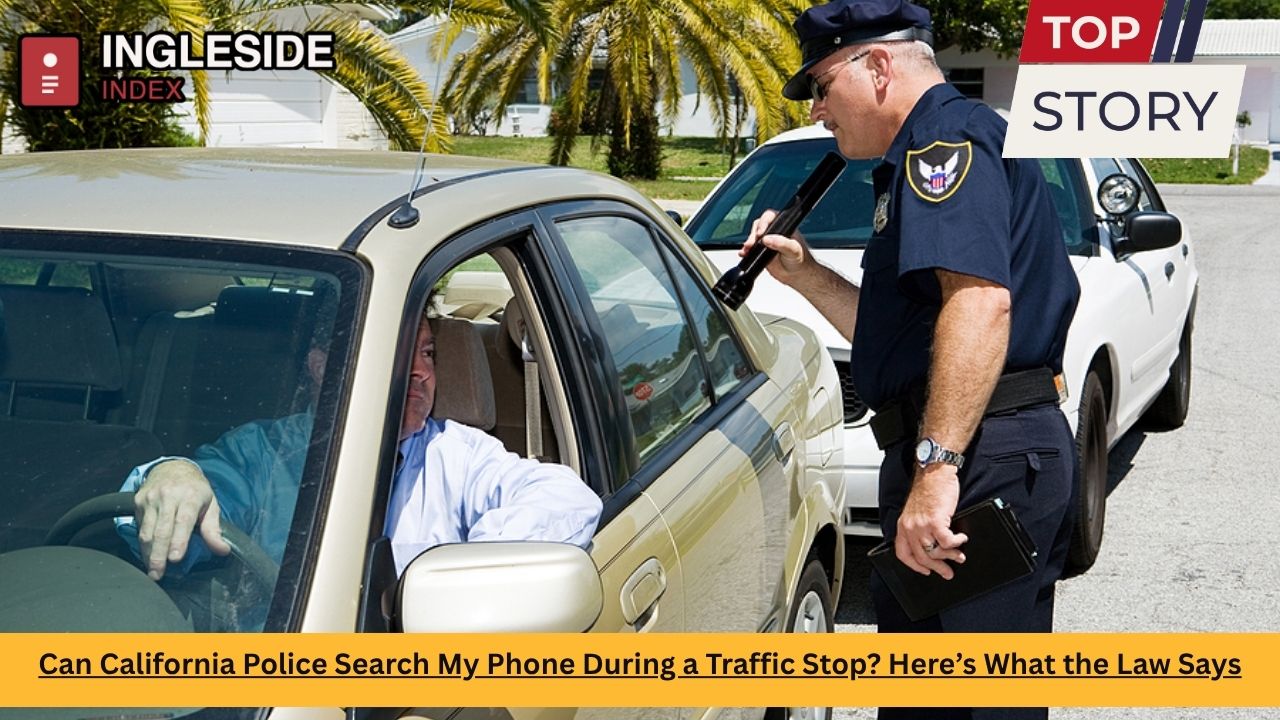It’s a scenario that many drivers in California fear: the flashing lights in the rearview mirror, an officer approaching, and then a request to see your phone. With so much of our personal lives stored on smartphones, the prospect of a police search can feel deeply intrusive. Understanding your rights regarding phone searches is essential, especially in technology-driven cities like Los Angeles, San Francisco, and San Diego, where encounters with law enforcement are common.
This comprehensive guide breaks down when and how California police can legally access your phone during a traffic stop, what the law says after landmark court decisions, and what you can do to protect your privacy.
The Rise of Smartphone Privacy Concerns in California
Residents across California, from the tech hubs of Silicon Valley to the sprawling highways of Southern California, carry phones that store not only calls and texts but also banking details, emails, medical information, photos, and real-time location data. According to the Pew Research Center, over 97% of Americans now own a cell phone, and for Californians, that number is even higher due to the state’s status as a technology leader.
With incidents of police encounters occurring daily on roads from Sacramento to Santa Ana, the question arises: Do these powerful pocket computers enjoy the same legal protections as our homes or papers?
Understanding Your Constitutional Rights
At the heart of the issue is the Fourth Amendment to the U.S. Constitution, which protects against unreasonable searches and seizures. The California Constitution also reinforces this right, sometimes providing even stronger privacy protections.
In 2014, a case arising from San Diego—Riley v. California—made national headlines and set a precedent for digital privacy. The U.S. Supreme Court ruled that law enforcement generally cannot search the digital content of a cellphone without a warrant, even after a lawful arrest.
What This Means for Drivers
If you are pulled over in Fresno, Oakland, or Riverside, the data on your phone is usually off-limits to officers unless certain conditions apply. Police may take your phone as evidence under specific circumstances, but that does not automatically mean they can explore its confidential contents.
When Can Police Search Your Phone?
Although privacy rights are robust, there are well-defined exceptions. Here’s a breakdown of how and when California police may access your phone during a traffic stop or following an arrest.
Search With a Warrant
The rule is simple: if law enforcement wants to examine your texts, emails, photos, or app data, they typically must secure a valid search warrant signed by a judge. That warrant must specify which device is to be searched and what evidence is being sought.
This applies in every city and county across California. For example, if you are stopped for speeding in Anaheim and officers believe your phone contains evidence of a crime, they must convince a judge that searching it is justified.
Search With Your Consent
Police sometimes ask, “Would you mind if I take a look at your phone?” If you agree voluntarily, officers may search your device—even if they do not have a warrant. This is common during routine stops on freeways near Sacramento, in busy Los Angeles neighborhoods, or on the streets of San Jose.
Your consent must be given freely and cannot be coerced. If you say no, the default protection against warrantless searches applies.
Exigent Circumstances
There are emergencies or “exigent circumstances” in which law enforcement may conduct a warrantless search. For example, if they believe that failing to act immediately would result in the destruction of evidence or harm to someone, they may be allowed to access your device.
Consider a situation in which the police in Long Beach stop a vehicle and believe someone’s life is in imminent danger based on information likely present on a phone—officers may search the phone right away to prevent harm.
Searches During Probation or Parole
California law allows for reduced privacy rights if a person is on probation or parole. Many probation and parole agreements specify that a person’s property, including their phone, can be searched at any time without a warrant. This is especially relevant in places like Bakersfield or Modesto, where probation-related stops are common.
Special Example: The Difference Between Seizing and Searching
Police may seize your phone under certain circumstances (such as during an arrest in Santa Monica), but holding the device is different from searching its digital contents. Officers can take your phone as evidence, but they cannot look through apps, messages, or photos unless one of the above exceptions applies.
When Can’t Police Search Your Phone?
Despite the above exceptions, the vast majority of traffic stops do not provide police the legal authority to search your phone. Here are key scenarios in which your privacy is protected:
-
Routine Traffic Stops: Simply being pulled over for a broken taillight in Irvine or a speeding ticket in San Bernardino does not give police the right to check your phone.
-
Incidental to Arrest: Even if placed under arrest—such as for DUI in Palm Springs—officers cannot search your phone without a warrant, absent an emergency or your consent.
-
Curiosity, Suspicion, or Intimidation: Police cannot merely demand to look at your phone based on a hunch or to fish for information.
The Landmark Riley v. California Decision
This Supreme Court case centered around a San Diego driver stopped for a traffic violation, whose phone was searched after his arrest. The evidence found on his phone led to further charges, but the Court ultimately decided that the unique nature of modern cellphones requires a different standard.
-
The Court held that cellphones are fundamentally different from wallets or purses due to the breadth and depth of data they contain.
-
Searching a phone without a warrant generally violates the Fourth Amendment.
The decision applies everywhere in California, from the Golden Gate Bridge to the U.S.-Mexico border in San Ysidro.
Real-World Scenarios Across California Cities
Los Angeles
With millions of drivers, LAPD officers are trained to request warrants for digital evidence. Consent searches are sometimes requested in high-traffic neighborhoods like Hollywood, but drivers are entitled to say no.
San Francisco
As a technology epicenter, San Francisco police encounters often involve digital privacy issues. Courts here have upheld the right to keep your phone data private unless one of the legal exceptions applies.
San Diego
With a busy border crossing, law enforcement faces unique challenges. While border searches sometimes follow different rules, inside the state non-border investigations must still comply with Riley standards.
Sacramento
As the state capital, Sacramento authorities often deal with legislative updates and cutting-edge privacy cases. Training emphasizes warrants and respect for digital privacy.
What If Police Illegally Search Your Phone?
If law enforcement violates your rights—for example, searching your phone during a traffic stop in Santa Clara without cause—evidence gained from that illegal search may be excluded from use in court. This is known as the “exclusionary rule.”
Your attorney can file a motion to suppress illegally obtained evidence. If the court grants that motion, the prosecution may have no case.
Can Police Compel You to Unlock Your Phone?
Another important issue is whether law enforcement can force you to unlock your phone.
Currently, courts in California generally hold that officers may not force you to unlock your device by entering a passcode or using biometric features like fingerprints or Face ID. This question is still being litigated and could evolve, but the right against self-incrimination (Fifth Amendment) provides additional protection.
What To Do If Police Ask To Search Your Phone
If you’re stopped in California and are asked to hand over your phone, keep calm and follow these steps:
-
Clearly and respectfully assert your rights. State, “I do not consent to a search.”
-
Ask if you are free to leave. If you are not being detained, you can walk away.
-
Do not physically resist. Never grab your phone back or act aggressively, as this could escalate the situation.
-
If presented with a warrant, comply. Do not interfere with the execution of a search warrant.
-
Contact a defense attorney as soon as possible.
The Role of Technology in Public Safety vs. Privacy
California’s metropolitan areas, like San Jose and Los Angeles, face the challenge of balancing effective policing with individual privacy rights. The ongoing debate highlights tensions between fighting crime and protecting digital privacy.
As cellphone use and digital data grow, lawmakers, courts, and police departments from Oakland to Riverside continually update their policies to reflect current technology and societal expectations.
Stats and Public Opinion
-
Californians own more smartphones per capita than most other states.
-
According to the California Department of Justice, millions of traffic stops are recorded in major cities like Los Angeles and San Francisco each year, but very few result in phone searches.
-
National crime data shows that digital evidence is increasingly part of investigations, but courts have consistently prioritized privacy.
Recent Developments and Future Trends
Privacy advocates and lawmakers in California often propose new bills to bolster digital rights. Municipalities like Berkeley and Santa Monica have implemented local policies to further limit warrantless tech searches by city police.
Expect ongoing debates, especially as mobile devices become even more central to daily life and criminal investigations.
Tips for Protecting Your Privacy
-
Use strong passcodes and enable device encryption.
-
Understand local laws, especially if you are on probation or parole.
-
Be aware of your right to refuse consent.
-
Do not share your password or unlock your device unless expressly required by a valid search warrant.
-
Seek legal advice if your phone is ever searched or seized.
Conclusion
California law provides robust protections for the digital privacy of its residents. Outside of warrant, consent, exigent circumstances, or specific probation/parole conditions, the rule is clear: Police cannot search your phone during a traffic stop. Major cities from Los Angeles to San Francisco, and every mile of the Golden State’s highways, conform to this standard.
KNOW your rights, assert them respectfully, and consult legal help if you believe your privacy has been violated. In a world where nearly all your life fits into a digital device, those rights are more important than ever.




